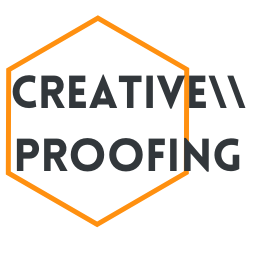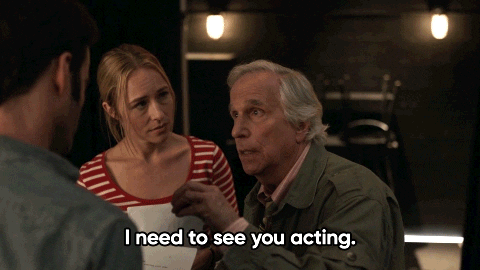I'm Megan J. Robinson, and this is Creative\\Proofing, a space to think, feel, and design out loud. Every Thursday I'll send you a newsletter exploring the intersection of creativity, spirituality, and productivity, and what that looks like for each of us. In each issue of Creative\\Proofing, I’ll dig into various questions, ideas, and topics by sharing what other thinkers, feelers, and doers have said, followed by my take, and then, what it do and what it mean for us going forward. I’ll also try to throw in reader feedback, recommendations, and maybe something I’m enjoying that week. Stick around to find out more, hmmm?
This newsletter is currently ad-free, and just free. (If that changes in the future, I'll be sure to let you know.) You can reach me anytime by replying to this email, and if someone sent this to you, they may be asking you to sign up as well. You can do that by clicking here.
If you'd like to listen, you can also subscribe to the Creative\\Proofing podcast.
So, a little confession here... I had to do some research into the origins of our modern emphasis on productivity. I actually hadn't really thought before about how we got to the point of having all of these tools, techniques, and methods available to us in the twenty-first century. Productivity is as simple as a to-do list and as complex as a production plant, and manifests everywhere these days. But first, what is it?
Dictionary.com defines productivity as:
the quality, state, or fact of being able to generate, create, enhance, or bring forth goods and services: The productivity of the group's effort surprised everyone.
Economics. the rate at which goods and services having exchange value are brought forth or produced: Productivity increased dramatically last year.
Grammar. the ability to form new words using established patterns and discrete linguistic elements, as the derivational affixes ness and ity.
(I didn't know that about grammar before...learn something new every day.)
What Others Say
As you might expect, productivity has its origins in...production...as in, the economics and automation of labor resulting in goods and services. Ye olde Adam Smith, of The Wealth of Nations fame, penned some of the earliest mentions of productivity, contrasting productive manufacturers with unproductive menial laborers (and generally placing greater value on the former). With the advent of the Industrial Revolution in Great Britain, the invention of the cotton gin in the American South, and then Ford's auto assembly line in the early 1900s, productivity became increasingly about getting more out of less.
Assembly lines really kicked into high gear during World Wars I and II with the need for war materials (and the entry of women into the workforce). As industry, commerce, and globalization expanded, individuals and families added responsibilities outside the home, but increasingly felt less time to attend to them, what with commuting and longer work hours. Fast and convenient food prepared by not-you gained ubiquity in the 1970s, along with the personal computer and the internet in the 80s, then Microsoft, Blackberry, and digital calendars in the 90s, and voila. An industry about industry was off to the races.
These days, productivity emphasizes time management, maximizing or optimizing workflows, and just generally improving efficiency in our habits, routines, and results, whether on an individual or a social scale. From David Allen's GTD method, to Tim Ferriss' The 4-Hour Workweek, to Michael Hyatt's Full Focus Planner, and the proliferation of day planners, online tools, productivity coaches, and smartphone apps, we certainly don't lack for options when it comes to ways of getting stuff done.
What I Say
So, another confession: I'm not actually a super-fan of productivity as we talk about it on the individual scale. With its roots in economics, industrialization, and labor management, I have concerns about the (over-)emphasis on assigning value to the visible results of our activities, and the focus on efficiency as the primary measurement of being productive. That said, I do think it's possible to appreciate productivity as a mindfulness practice: paying attention to why we do things as much as what we do and how we do them.
Here's my take. Efficiency focuses on process; effectiveness focuses on purpose. When we act, we're always balanced between two extremes: that of efficiency (doing things right) and that of effectiveness (doing the right things). Most of the time, we slide along this spectrum, depending on our context, goals, and personal tendencies.
If you stop and think about it, do you prefer to be efficient and maximize your time, capability, function, capacity, etc? Or do you prefer to be effective and maximize your impact, reach, learning, etc? There's no right or wrong answer here - this is about recognizing who you are, and what your initial impulses are when you go to act. You need both in your life if you want to accomplish anything that you want to accomplish. But most of us will land more often on one side of this spectrum than the other.
When I think of efficiency, I think of:
shaving time off my activities
beating my best time
doing more with less effort
getting more results with less investment
reducing friction in my habits and tools
getting sh*t done
When I think of effectiveness, I think of:
acting with great intention
pursuing the right or best things
doing the next right thing
taking more time to identify and refine my goals
deepening my learning in the experience
taking the slower route
appreciating the experience
I tend to fall on the effective side of the spectrum more often than not, though I've learned to recognize when efficiency needs to come into play. The question is, depending on your context and goals, which one do you want to emphasize in a given moment?
Again, we need both efficiency and effectiveness; it's necessary to hold these together in our lives to get anything done, and to get the right things done. But when considering who you are, what you want to do, and how you want to do it, especially when integrating techniques, habits, and routines to support that, it helps to know what you're designing for: doing things right, or doing right things.
What Next?
So, the next time you make lists for a project or, y'know, your life, stop and think about which side of the spectrum your to-do's fall on. If you're thinking about getting as much done in as little time as possible, ask yourself why each of those things needs to be done (granted, sometimes you may not have control over the why). If you find yourself deliberating over options and directions indefinitely, remind yourself that efficiency is also about creating momentum, and getting some "did-that's" under your belt can provide some clarity and focus to your efforts.
Either way, bringing this little bit of awareness to your day can help you allocate your time, energy, and resources in ways that genuinely support what matters to you.
Let me know what you find out.
"It's better to do the right things inefficiently than the wrong things super efficiently." - August Bradley
Creative\\Responses
Got a question, feedback, or something to share? All you have to do is reply to this email and write me! (Be sure to let me know if you want to remain anonymous, or if it's ok to use your first name.)
Creative\\Recommendation
The spark that really got me thinking about the balance of efficiency and effectiveness came through this video by productivity coach August Bradley. Worth a listen.
Monthly Reviews In Notion - Master Level Life Alignment
Creative\\Enjoyment
Listening to the Foo Fighter's "Shame Shame" on repeat. #90sKid
Tell your friends.
If you’d like to support Creative\\Proofing, the best thing to do is spread the word. If you think of five friends who might enjoy this, forward this email to them! Degrees of gratitude may vary, but please know, my gratitude is infinite.
You can share Creative\\Proofing on all the socials. You can also follow on Instagram @R21.5Coaching.
Shalom!





